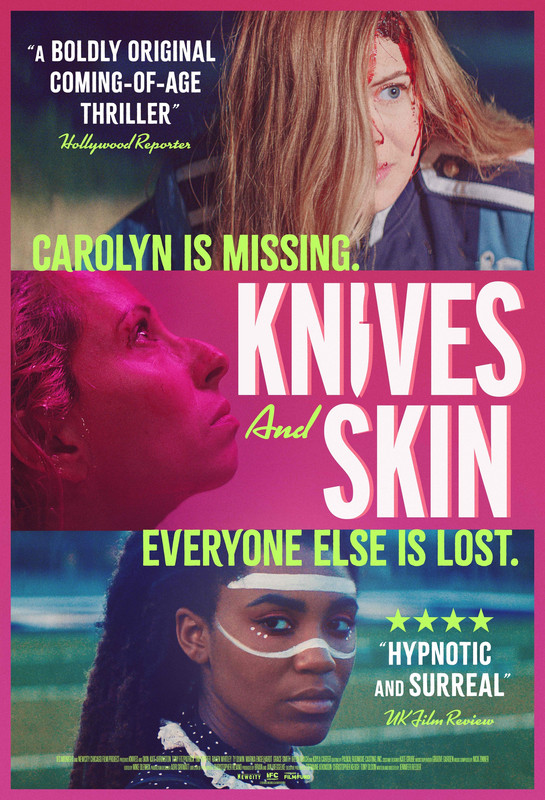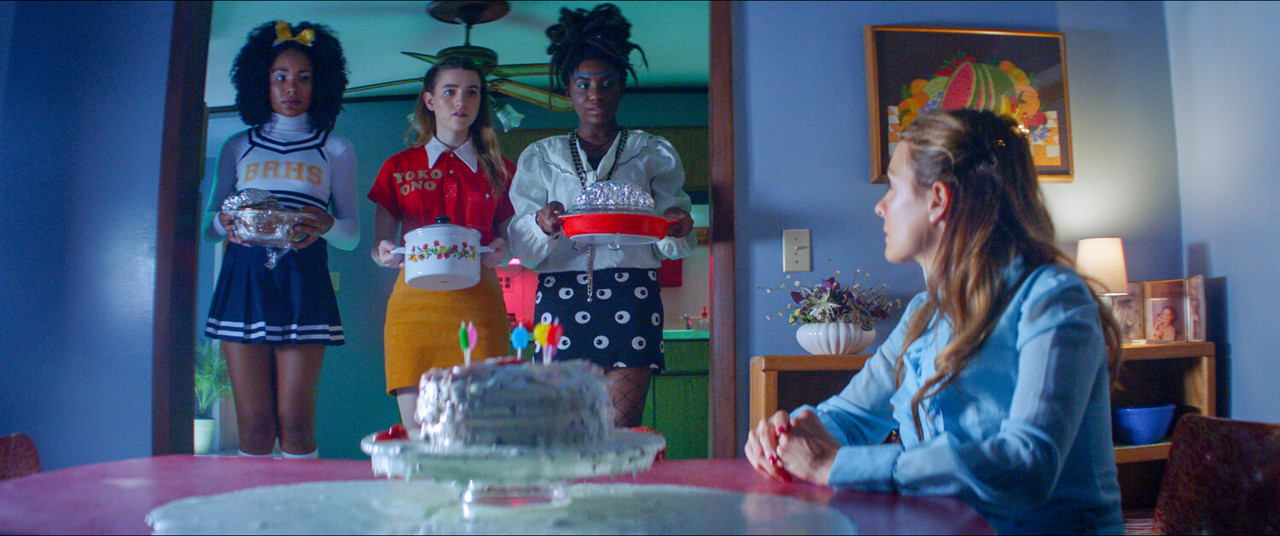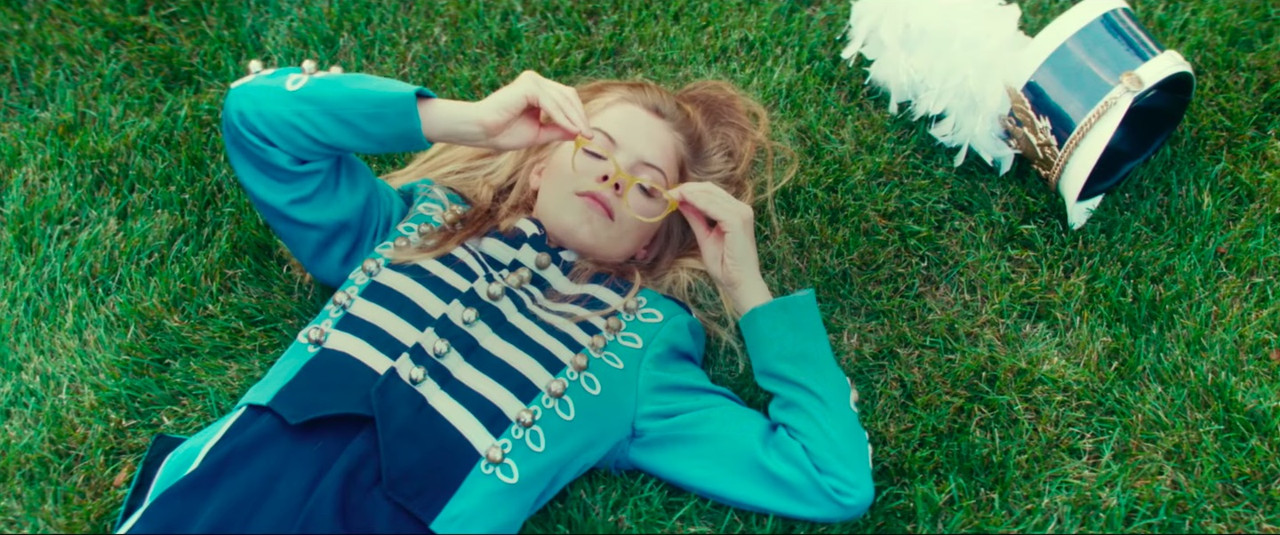Dir: Jennifer Reeder
I’ve only seen a handful of Jennifer Reeder’s short films, but this feature feels like a logical extension of them. Those shorts screened in the London Film Festival’s Experimenta programme, but I always believed I saw Reeder’s interest in genre trying to force its way through her more abstract imagery. The images may lean more towards traditional narrative cinema here, but the tone remains deliciously off-kilter, in a way that draws us into what feels like a reality-adjacent world where Reeder is in full control.
15 year old Carolyn Harper (Raven Whiteley) has gone missing, and the film explores the aftermath of her disappearance and its effect on the small town she lives in; her peers at school, as well as her mother, Lisa (Marika Engelhardt) and the other adults in the community.
As befits a director with Reeder’s experience, Knives and Skin is, from the first frames, a supremely confident film. We are thrust straight into its neon-dipped world, discovering Lisa looking for her daughter, knife in hand, then pulling on one of her daughter’s dresses when she finds her gone. This sets a mood for the next 110 minutes, establishing the slightly off feeling of the film’s world, the bright and bold look and the way it mixes a wide streak of humour into its overwhelmingly melancholy tone. There is so much going on here, so much that Knives and Skin is about. On the surface, it’s largely about how a single death—even that of a person who may not have been especially popular—can echo through a community, but look beneath that and there is a film about girls and women, about feminism and representation, about relationships, about high school and about high school movies. Even that list doesn’t cover all the bases.
Everything is filtered through Reeder’s dialogue, which has a very specific feel. It takes a moment to adjust to at first, but soon we and the film settle into its rhythm. Soon after her daughter has disappeared, Mrs Harper is talking with the local Sheriff, who says that he’ll get his wife to make her a casserole “I don’t think it’s time yet for casserole”, she replies. This moment distills the dialogue style beautifully; the cadence is slightly off, but the words themselves are expressive and full of underlying meaning. We know from the start that Carolyn is gone but in this moment her mother isn’t ready to give up hope that her daughter will be okay.
Other themes are also explored. The film is timely in its feminist approach. Early on, Reeder looks to reclaim the depiction of girls in teen movies. As Joanna (Grace Smith) and Jesse (Robert T. Cunningham) discuss their relationship to Carolyn he says “She could be pretty mean, so can you”. “That’s all we’ve got”, comes the reply. This feels like a direct riposte to the stock character of the popular bitchy girl, and also an acknowledgment of how women, whatever age, are judged more harshly for not appearing ‘nice’. We don’t actually see much meanness between the girls, but Joanna has a hard side, expressed to exploitative men in her life—a line about a sandwich near the end of the film is, remarkably, both laugh out loud funny and properly rousing. The film’s thesis statement about high school girls, if it has one, comes towards the end when Laurel (Kayla Carter) tells her soon to be officially ex-boyfriend “I’m not a bitch, I’m not a slut, I’m not a tease. You treat girls like shit”. It’s a powerfully blunt statement, later underlined in a perfect visual moment.
These are just some of the ways in which Reeder tries to get us to look askance at high school movies of the past, while also making clear her respect for the genre. Much of the film’s last fifteen minutes seems dedicated to this idea of depicting familiar moments but putting a twist on them. For instance, there is plenty of buildup to the homecoming dance, but it’s a performance by Charlotte’s band, rather than the date the film has been setting up, which ends up being the most important part of the scene, while a potential suicide scene becomes one of the film’s most hopeful and funniest (Joanna: “Please don’t jump, you’ll make a mess down here and it’s already such a fucking mess down here”)
Of course, meaning is unpacked in the visuals as much as in the dialogue. Clothing, in particular, is given great significance. Several things related to Carolyn (her blood, a scratch she makes on her would-be boyfriend) glow, but it’s her glasses that become something of a talisman, spending the majority of the film shut away in a school locker, emanating a neon light, like the last piece of energy left from Carolyn trying to reach out into the world. For the other characters, clothes are a signifier of who they are (or would like to be), whether it’s Joanna’s T-Shirts, all monogrammed with the names of women like Angela Davis, Yoko Ono or Joan of Arc, her mother’s (Audrey Francis) Lion T-Shirt, or Charlotte’s (Ireon Roach) striking make up, and eventual acceptance of a pink homecoming dress. This is perhaps a little on the nose when it comes to Joanna’s dad; a literal sad clown who is cheating on his wife.
The use of music is striking throughout. Nick Zinner’s electronic score has a chilled ambiance, which pairs beautifully with the melancholy of the film. It’s not what you’d expect from the Yeah Yeah Yeahs guitarist, and is more reminiscent of Para One’s score for Celine Sciamma’s Water Lilies. However, the most daring use of music comes through the songs Reeder uses, largely 80s new wave hits sung by a choir coached by Carolyn’s mother. Some are staged simply as the choir rehearsing, but the use of Modern English’s I Melt With You is especially beautiful, as it’s sung by two girls falling in love, their faces and voices cross-fading into each other. These sequences are peppered throughout the film with such regularity that you could almost call it a musical, with each song serving a different emotional purpose within the narrative.
The performances from, at least to me, a largely unknown cast, are outstanding all round. Reeder has found memorable faces who deliver performances of great nuance. It’s worth noting Raven Whitely as Carolyn who, though she has relatively little presence in the film, establishes her character quickly in the opening scene and then haunts the movie, her presence hanging over it throughout. However, the two major standouts here are Grace Smith as Joanna and Marika Engelhardt as Lisa. Smith puts across a character who is extremely smart and uncompromising in her dealings with others, willing to exploit them, but there’s also a chink of warmth we can see under that shell, especially for her parents. It’s a terrific performance and should bring Smith a lot more work. Engelhardt’s performance is raw and vulnerable, dazed by concern but also trying to hold it together (“People keep asking me how I’m doing. It’s really annoying, but I know eventually they’ll stop asking, so I’m trying not to be an asshole about it”). Her best scene, and maybe the movie’s, comes when she gets into a boy’s car, believing she can smell how her daughter used to smell. It’s at once uncomfortable, deeply sad and blackly funny and Engelhardt hits every note perfectly.
There is so much still to say about Knives and Skin, whether it’s the production design (the tinfoil wrapped pillows Joanna’s mother sleeps on; Reeder's nod to her short Blood Below the Skin) or the darkly comic incidents (the reveal about the sheriff’s wife’s pregnancy). On an analytical level, I’ve only scratched the surface of what I have read into it, and I’m sure further viewings will prompt more ideas. This is all to say that this isn’t just a great film (though it is), but that it’s an interesting and deeply rewarding one that will have you turning its images and ideas over in your head long after the credits roll. Seek it out immediately.
★★★★★




No comments:
Post a Comment